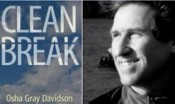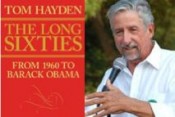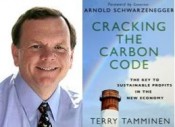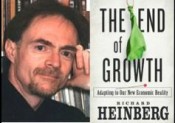Q&A: Osha Gray Davidson – Germany
Written on January 11th, 2013 |
Aired 01/06/12
In the year 2000, Germany got 6% of its energy from renewables. That’s about what we get in the US today. But today Germany gets 25% of its electricity from solar, wind and biomass. And Germany is not exactly the American Southwest. Perhaps just as impressive and important, 65% of the country’s renewable power capacity is owned by individuals, cooperatives and communities. Clean and decentralized. I’ll be talking with Osha Gray Davidson about how they did it and what we can learn from their story.
Osha is new to me, but I contacted him immediately as soon as I saw his new book CLEAN BREAK: The Story of Germany’s Energy Transformation and What Americans Can Learn from It. As anyone who listens to this show knows, I feel one of the crucial elements in America’s sluggish response to many of our biggest challenges is our ignorance about what other countries do well.
www.oshadavidson.com
Q&A: TOM HAYDEN – The Long ’60s: From 1960 to Barack Obama
Written on October 31st, 2012 |
Aired 10/28/12
I haven’t done a lot about the election on this show. I’ve been talking more about the foundational issues that underlie the situation we find ourselves in — an age of very imperfect politics, government, finance, and business. Our democracy and our governance are dominated by a handful of billionaires, and a number of multimillionaires and their corporations who do not share the interests of the larger society.
But In early September I read a piece by Tom Hayden at Truthout.com. Over the next several days, it appeared all over the progressive blogosphere – Saving Obama, Saving Ourselves. I immediately contacted Tom to come on and talk about the election.
Among other things, he reminds us of the accomplishments of the first Obama administration in light of the actual political and economic circumstances he faced. He also looks at history of previous social movements. How did they interact with the political process in pursuit of their goals? And what did they gain and sacrifice in the process?
HAYDEN: “History will show that the first term was better than most progressives now think…By their nature, the achievements of social movements are lesser versions of original visions…If Obama loses, it will be unfair to blame the left, but they will be blamed nonetheless. As a consequence they will become more marginal, far less able to connect with the progressive constituencies and mass movements with vital stakes in Obama’s re-election.”
Q&A: Terry Tamminen – Cracking the Carbon Code
Written on September 4th, 2012 |
Aired 09/02/12
When I first met TERRY TAMMINEN, he was living on a houseboat in the Marina and filling a position he’d founded as the first Santa Monica Baykeeper. No too long before that, he had been running a pool services company. And not too long after, he was Secretary of the California EPA.
Tamminen has reinvented himself successfully in several very different worlds — business, government, non-profit, foundation, from the grassroots to the halls of power. All of this for a long time now to achieve a sound and healthy relationship between society and the environment. He pursues that consistent vision with whatever works.
We’ll talk about the ideas in his book, CRACKING THE CARBON CODE: The Key to Sustainable Profits in the New Economy – which is very much a plan of action for companies who figure out that reducing carbon emissions reduces waste and is therefore good for the bottom line. He’ll tell stories of companies that have made or saved money by cutting carbon.
How has he been able to move things forward through politics and government in an era when so little seems to get done? Bottom line, are we moving fast enough? If not, how do we integrate all these different players to accelerate movement in the right direction?
http://seventhgenerationadvisors.org
HOW DO WE OCCUPY THE GAP?
Written on February 1st, 2012HOW DO WE OCCUPY THE GAP?
Q&A: RICHARD HEINBERG, author, THE END OF GROWTH: Adapting to Our New Economic Reality
Written on December 13th, 2011 |
Aired 12/11/11
Economists, politicians, and pundits insist recovery is at hand, yet unemployment remains high, real estate values continue to sink, and governments face record deficits. Today’s guest, RICHARD HEINBERG has a new book, The End of Growth, in which he proposes a startling diagnosis: humanity has reached a fundamental turning point in its economic history. He talks about the new normal that recognizes the limits to growth imposed by resource and disposal limits, climate change, and population growth.

